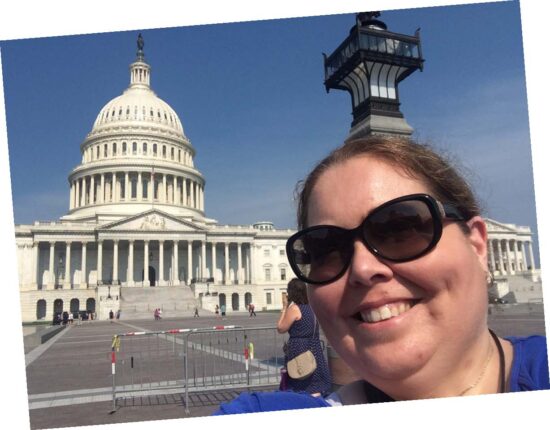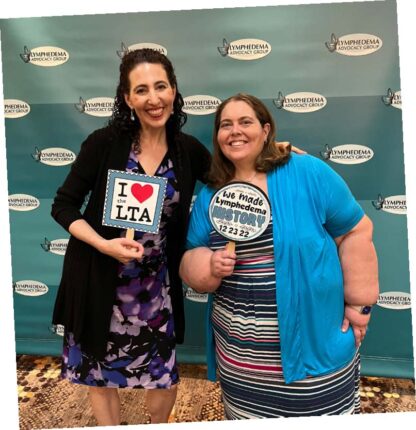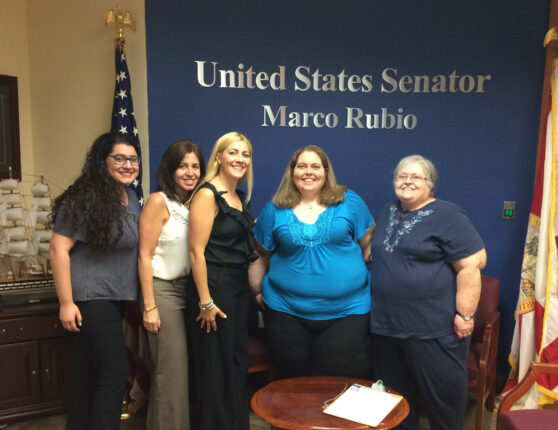By Sarah Bramblette, MSHL

In the final months of 2022, I experienced both the worst and the best days of my life. It was in October that my mother passed away after I had taken care of her for over a year. In a way, I saw it as repaying her for raising me to become the strong advocate I am today.
Lessons in Standing Up for Myself
I can recall an incident from my elementary school days that exemplified my mother’s unwavering support. Once, a reading teacher pinched my arm, and when I informed my mom, she promptly wrote a note to the teacher. The teacher, however, accused me of lying, saying my arms were too fat to be pinched. My mother talked to the principal, asking to place me in a different reading class. This experience taught me the importance of advocating for myself, especially in the face of mistreatment based on my weight. My mother’s advocacy laid a strong foundation, and I continue to carry those lessons with me.
A Sign From Mom
On the morning of her funeral, I woke to notification that the Lymphedema Treatment Act (LTA), one of two bills I had been advocating for, was going to be voted on in the House of Representatives. This was huge news, and I took it as a sign from Mom. That week, the LTA passed in the House with an overwhelming vote of 402-13.
In December, the Lymphedema Treatment Act (LTA) was signed into law as part of the Consolidated Appropriation Act of 2023. It marked the culmination of 13 years of grassroots advocacy and served as a powerful testament to the impact of our stories in creating change.
Recently, I went to Washington, DC, to celebrate the passing of the LTA. As I was walking into the Capitol building, I saw Congressman Wenstrup coming out. When I lived in Ohio, he was my representative. My advocacy to get the Lymphedema Treatment Act (LTA) and the Treat and Reduce Obesity Act (TROA) passed started with a meeting with his district staff in a small room at my local courthouse. Now, 10 years later, I was able to personally thank him for supporting the LTA and for being a co-lead of the Treat and Reduce Obesity Act.
Two Decades of Advocacy in the Healthcare System
It has been 10 years since I first met with Rep. Wenstrup’s staff, but it’s been more than 20 years since I’ve been advocating for myself in the healthcare system. In 2003, I had Roux-en-Y (RNY) gastric bypass surgery, and it was covered by Ohio Medicaid. However, the hospital told me I needed approval from Medicaid before they could see me for the first appointment. My primary care doctor didn’t know how to get Medicaid approval. But since I had recently been diagnosed with lymphedema, and that doctor had already obtained approval for a compression pump, I asked that office for the contact information for Medicaid. I gave it to my primary care doctor, and she wrote a letter, and I got approved!
A year after surgery, I moved to Miami for my first professional job. I was excited to have real insurance, but my excitement didn’t last long when they refused to cover my extra therapy visits for lymphedema treatments. I then found out that even though they covered lymphedema compression garments, there were no suppliers nearby that accepted insurance. The supplier my therapists used was in another state and not in my network, but their staff coached me on what to ask the insurance. After a few phone calls, I finally got coverage for my garments. But the battle repeated itself every year. When I learned about a bill introduced to address coverage for lymphedema compression garments, I immediately started reaching out to my members of Congress.
I’ve Been Trained
In 2012, I took part in Advocacy Training during the Obesity Action Coalition’s first Your Weight Matters Convention. Along with teaching us how to share our personal stories to promote the passage of TROA, they also prepared us with Congressional Hill meetings. This helped us experience different situations we might encounter while advocating, and the OAC gave us advice on how to handle those situations. The most important advice they gave us was to stay focused on the topic, stay positive, and never burn bridges. We were also taught to do research so that we could tailor our message to fit the priorities of the person whose support we were seeking.
I decided to sign up to receive newsletters from my members of Congress, and one day I got an email announcing that Rep. Wenstrup’s staff was going to have a Mobile Help Desk at my county courthouse.
I gathered all the information I had about the Lymphedema Treatment Act and the Treat and Reduce Obesity Act, both of which I found on the organizations’ websites. When I got to the courthouse, the staffer was in a small meeting room, and there were already some other people talking to her. When it was my turn, I gave her the information and shared my personal story and why both bills were important to me. When I was finished, she said, “Wow, you’re really prepared.” I just replied, “I’ve been trained.”
A couple of weeks later, I got a call from Rep. Wenstrup’s Health Legislative Aide, who worked in his office in Washington, DC. Then, later that summer, Rep. Wenstrup was hosting a Coffee with Constituents event, and when I went, the staff member from the courthouse recognized me and made sure I had the chance to meet the Congressman. Since he was a podiatrist, he understood both issues well and promised to help.
Pack your Patience and Be Persistent
Anything worth having is worth fighting for, even if it takes a long time. I always remind myself that my chronic conditions are never going away, and neither will I.
What motivates me to keep fighting? It’s knowing what is possible and seeing small steps of progress. Ultimately, I am paying for insurance coverage to provide me with a service, and I expect to get the same level of service as others. We all pay for a certain internet speed, and if we don’t get the speed or connection we pay for, we complain. I pay for healthcare, so I should have coverage for treatment of my health conditions — period.
It took a total of thirteen years for Congress to pass the Lymphedema Treatment Act, but with each session of Congress, we gained more cosponsors for the bill. We faced many challenges that were beyond our control, but we adjusted our strategy accordingly. When there were changes in leadership in the House and Senate, we had to work with new members and staff to push our bill forward. There were times when our bill leaders retired, and we had to find new members to support our legislation. Then, the pandemic came, and once again, we had to adapt and tailor our message to match the priorities Congress was focused on addressing. The squeaky wheel gets the grease, so we kept in consistent communication with members of Congress and gained more cosponsors by staying persistent. Throughout the process, we educated staff, raised awareness, and empowered advocates.
Now is the Time for Action
Advocacy is all about building relationships — not only with other advocates but also with stakeholders and people in positions of power who can make the changes we are asking for. This often includes the politicians who represent us at different levels of government, as well as the staff members in the agencies that run and oversee programs.
With the availability of more effective medications for treating obesity, it’s important for us to work harder to get coverage for these treatments. You can begin advocating right from your own home. The summer season offers many chances because Congress takes a break, and your members of Congress will be spending more time in their districts. Many politicians have booths at local county and state fairs, so stop by and have a chat with their staff. If you’re lucky, you might even get to talk to the politicians themselves.
Do You Want to Share Your Story?
Whether you have a story about navigating obesity, facing weight stigma, or inspiring others, your voice is important. Visit the OAC’s story project at WeightoftheWorld.com to share yours today. Not sure what to say? Consider one of our question prompts to guide you.
If you would like your story to be featured in a future issue of Weight Matters Magazine, please email membership@obesityaction.org.

